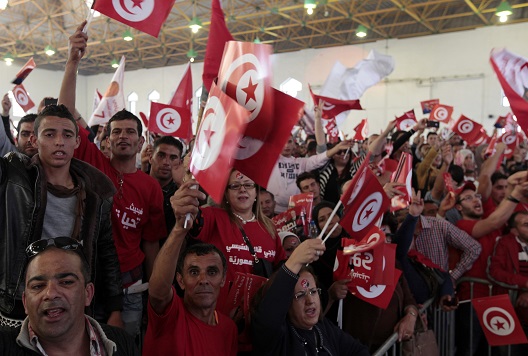 After the parliamentary elections of last October, Tunisia will continue with its final steps toward democracy as it embarks on presidential elections scheduled to take place this Sunday, November 23. Thus far, Tunisians have never had the chance to participate in the selection of their head of state through direct suffrage, even after the fall of Ben Ali’s regime and the election of a National Constituent Assembly in 2011. Tunisians will finally be able to choose, but some might wonder if there is any point. The image of the president of the republic has been tarnished by outgoing-President Moncef Marzouki’s questionable practice of power, making his presidency a destabilizing and divisive factor in Tunisia’s political scene over the past three years.
After the parliamentary elections of last October, Tunisia will continue with its final steps toward democracy as it embarks on presidential elections scheduled to take place this Sunday, November 23. Thus far, Tunisians have never had the chance to participate in the selection of their head of state through direct suffrage, even after the fall of Ben Ali’s regime and the election of a National Constituent Assembly in 2011. Tunisians will finally be able to choose, but some might wonder if there is any point. The image of the president of the republic has been tarnished by outgoing-President Moncef Marzouki’s questionable practice of power, making his presidency a destabilizing and divisive factor in Tunisia’s political scene over the past three years.
Under the new constitution, the president would serve a term of 5 years and share executive powers with the Head of Government (the new title for prime minister under the new constitution). Presidential powers, however, would remain limited foreign policy and defense with little control over domestic policy. Nonetheless, the president has some control over the legislative agenda given the constitutional right to initiate legislation and the ability to dissolve parliament. A candidate would need to win an absolute majority to be elected after the first round, otherwise a runoff will be held on December 28, 2014.
Although twenty-three candidates from different political backgrounds and other non-partisan candidates will run for the presidency, four candidates have already dropped out of the race. Nonetheless, politics in Tunisia has moved rapidly. Nidaa Tounes has already grabbed a plurality of seats in parliament, presidential campaigns have brought hundreds of supporters to public rallies, and rumors of party coalition negotiations give an indication of intense political mobilization, particularly in light of the fact that the ruling coalition will have the power to form the future government.
The elected president, however, will get to appoint the person from the leading majority party or coalition to form the new government. In that regard, the presidential elections will either cement the control of the secular, modernist parties such as Nidaa Tounes or promote new opposing alliances around the so-called consensual candidate—an improbable but conceivable scenario. In any case, the chosen president will likely bring more coherence to the dual executive system, play an important role as guarantor of national unity, and promote equilibrium between power brokers.
Polls strongly favor Nidaa Tounes’ prominent leader Beji Caid Essebssi, an 87-year-old veteran politician who served under Ben Ali and his predecessor Habib Bourguiba, and whose party won the most seats in parliament (39 percent) in the October elections. The Islamist Ennahdha, the second strongest party in parliament, chose not to field or endorse a presidential candidate. Marzouki remains a candidate for his own succession and hopes to maintain the tactical support of part of the Islamist electorate. Others like Hamma Hammami and his popular front, a left centered coalition will try to consolidate the gains made during the legislative elections and stand as strong potential contenders for the presidency.
As the candidates conduct their campaigns, a recurring theme invokes the historical legacy of Tunisia and the Islamic identity of its people. Candidates uniformly promise to restore the state’s domestic authority, protect citizens from terrorist threats, and address stiffing socioeconomic problems. With power over these issues largely in the hands of the Head of Government and the ruling parliamentary coalition, however, such claims are less grandiose than they appear, falling on relatively deaf ears and failing to galvanize the public.
A resurgence of divisive language has also surfaced during the first week of the campaign. Some candidates have enthusiastically delivered fiery speeches vilifying their political opposition. The highly controversial League for the Protection of the Revolution, a group involved in much of the political violence in Tunisia during the stormy transition led by Ennhadha party and its coalition, has also resurfaced, promising revenge and reprisals should Nidaa Tounes and the acolytes of the old guard win the elections. A number of the candidates have also reported threats of assassination. Others use self-aggrandizing language, claiming to be the most fit to govern while lobbing offensive and sometimes defamatory statements against other competitors. In this context, substance matter not.
Ultimately, voters—tired of political bickering and populist language—will choose a president who will uphold the standard for modern and democratic societal change. Politicians still have much to learn in order to reach their constituents and, in that sense, the presidential elections will provide another learning opportunity as political key players in the country take office. In the end, the process will benefit the nascent democratic experience in the region, which will have to put forward important institutional and economic reforms to address the daunting challenges ahead.
Haykel Ben Mahfoudh is a professor of law and political science at the University of Carthage in Tunisia and a nonresident fellow with the Atlantic Council’s Rafik Hariri Center on the Middle East.
Image: Supporters of Beji Caid Essebsi, leader of Tunisia?s secular Nidaa Tounes party and presidential candidate, wave national flags during his campaign event in Sfax November 20, 2014. Tunisia's presidential election is scheduled to be held on November 23. REUTERS/Anis Mili
